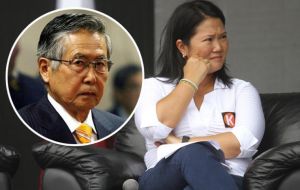MercoPress. South Atlantic News Agency
Keiko Fujimori wins first presidential round in Peru, but polls anticipate she could lose the run-off
 A quick count by polling firm Ipsos said Fujimori had 39.6% of the vote with Kuczynski on 21.5% and leftist lawmaker Veronika Mendoza on 18.7%.
A quick count by polling firm Ipsos said Fujimori had 39.6% of the vote with Kuczynski on 21.5% and leftist lawmaker Veronika Mendoza on 18.7%.  Early results and exit polls also showed that Kuczynski, a 77-year-old former World Bank economist, had a lead for second place and a spot in the run-off, although the results could still change
Early results and exit polls also showed that Kuczynski, a 77-year-old former World Bank economist, had a lead for second place and a spot in the run-off, although the results could still change  Despite her lead on Sunday, polls have shown Fujimori could lose the June 5 run-off vote because many voters opposed to her father's authoritarian rule in the 1990s are likely to rally behind her riva
Despite her lead on Sunday, polls have shown Fujimori could lose the June 5 run-off vote because many voters opposed to her father's authoritarian rule in the 1990s are likely to rally behind her riva Fujimori, the conservative daughter of jailed former president Alberto Fujimori, won the first round of Peru's presidential election on Sunday but she will likely face center-right economist Pedro Pablo Kuczynski in a tight run-off. Exit polls and early official results showed Fujimori with close to 40% support, falling well short of the 50% needed for an outright victory.
A quick count by polling firm Ipsos said Fujimori had 39.6% of the vote with Kuczynski on 21.5% and leftist lawmaker Veronika Mendoza on 18.7%.
Early results and exit polls also showed that Kuczynski, a 77-year-old former World Bank economist, had a lead for second place and a spot in the run-off, although the results could still change as more votes come in from more remote areas.
With 40% of votes counted, Peru's electoral authority said Fujimori led with 39.2% while Kuczynski had 24.3% and Mendoza 16.6%.
Despite her lead on Sunday, polls have shown Fujimori could lose the June 5 run-off vote because many voters opposed to her father's authoritarian rule in the 1990s are likely to rally behind her rival, whether it is Kuczynski or Mendoza.
The son of European immigrants, Kuczynski is a pro-business economist and a former finance minister but is more moderate on some social issues than Fujimori, 40, and does not have the baggage associated with her last name.
“We don't want a polarized nation,” he said after dancing in front of supporters on Sunday night, although he urged calm until official results were in. “We have made progress but not enough. We are going to make a progressive government, socially and economically.”
Fujimori has said she would drive economic growth forward at the end of a decade-long mining boom by tapping a rainy day fund and issuing new debt to fund badly needed infrastructure. She has portrayed herself as the only candidate who would be sufficiently tough on crime.
Financial markets will likely rise on news of a Fujimori-Kuczynski run-off if it is confirmed.
Mendoza, 35, promised leftist social reforms and said Peru's powerful mining industry should have less influence. She also wants to stop exporting natural gas to favor domestic use. She thanked her supporters on Sunday night from her home city of Cuzco, once the capital of the Incan empire. “We've shown that we can do politics differently,” she said.
Fujimori's chances in the run-off will depend largely on whether she can distance herself from her father, who was convicted of corruption and human rights abuses tied to his 1990-2000 rule. She says her father will ultimately be absolved by the courts but has promised not to use her power if she is elected to free him from prison.
Human rights activists remain wary and protests on 5 April, 24 years after Alberto Fujimori dissolved Congress, drew tens of thousands of Peruvians. Fujimori's rejection rates jumped after the protests, with 51% of Peruvians saying they would “definitely not” vote for her, one poll showed.




Top Comments
Disclaimer & comment rulesCommenting for this story is now closed.
If you have a Facebook account, become a fan and comment on our Facebook Page!